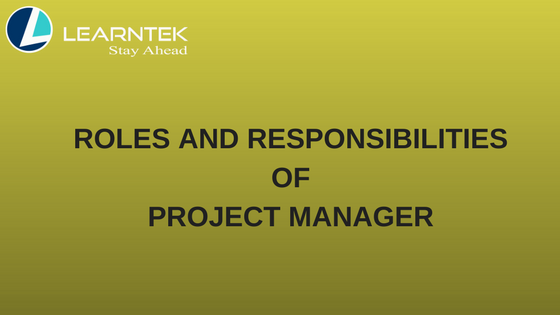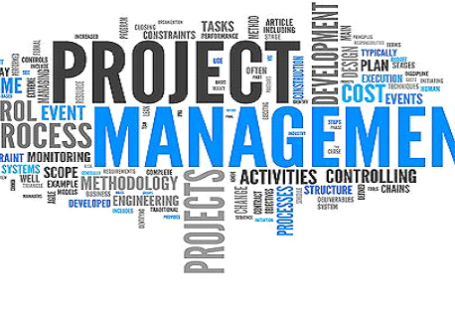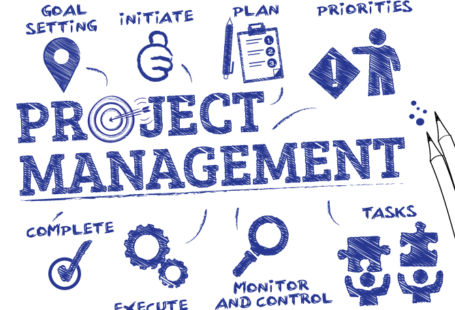Roles and Responsibilities of Project Manager –
Project Manager :
A project manager refers to a person with the full responsibility, planning, execution, controlling, monitoring, and closure of the project. The project manager main job is to oversee, budget, plan, and document the aspects of the project that you are working on.
It is very important for the project manager to liaise with the top management, to ensure the direction and the scope of each project is well planned. Generally, he is fully accountable for any failure or success of a given project. Additionally, to achieve successful project, it is as a result of good planning and collaboration from other members of the project.
Roles and Responsibilities Of Project Manager :
Roles and the responsibilities of project manager might as well be called project director roles. They are the leaders of the entire team that is performing the actual task of the project. The project board gives them the responsibility of the project.
A key function of the project manager is to encourage the people around him or her, to see the importance of business transformation. This role is very vital in setting the tone of readiness for the change. This will help in making the project a success with great impact. However, the project manager has to set some specific responsibility.
• Monitoring the progress: At the initial stages, all the teams and their project managers have a defined vision and great hopes of achieving desired results. However, the road to the finishing line is quite bumpy. This is when not all the set things go as planned. Therefore, the project manager is required to analyze and monitor the team performance and expenditure. Thereafter, he is required to take the necessary steps.
• Managing the reports and documentation: The final reports and documents are very important aspect of any project. A good project manager can present comprehensive documents and reports of the project. This can be an indication that all the set requirements were achieved.
• Managing and analyzing project risk: When the project is quite big, there is likely to be many hurdles that were not part of the primarily plan. Challenges are inevitable. Good project manager know how to meticulously evaluate and identify possible risks, before a project starts. They also know how to minimize or avoid completely the risk.
• Ensuring satisfaction of the customer: Generally, a project will only be a success if the client or the customer is pleased by the work done. A project manager has a role of minimizing the uncertainty or un wanted surprises. Therefore, it is very important to engage the client fully in the project. It is very basic to know how to engage the client through effective communication.
• Developing Budget and cost estimating: It is a role of a project manager to keep he project within the specified budget. It does not matter even if the project meets the client goals or delivered on time. it will be a big failure if it gets over the set budget. It is very important for project managers to review the budget quite often and avoid budget overruns.
• Time management control: Majority of clients normally judge the success of the project based on when it was delivered. Therefore, there is no negotiation on deadlines. A good project manager will always have a way of setting realistic deadlines. They will also communicate the same to their team members consistently. They will effectively do the following:
• Develop schedule
• Define activity
• Maintain schedule
• Estimate duration
• Sequence activity
• Motivating and organizing the team: Effective project managers do not engage their team with long checklists, spreadsheets, and white boards. They put their center and in front. They usually come up with plans that stimulate team members in reaching the potential. They cut down all necessary activities and narrow everything to the set goals.
• Resource planning and activity: To plan is very essential in meeting the projects deadline. Poor planning results to poor projects. It is the role of the project manager to identify the ideal scope and all available resources. A project manager is required to realistically set the time evaluate the team capability.
They will then create a clear report to the monitoring team and the top management team. Generally, projects are much unpredictable, so a good manager will create a room for any adjustment that might come in during the project. Some of which may come in are very important for the project. Mostly they are experienced when at the final stages.
• Leadership: A project manager acts like the leader of the project. With the right leadership, all the team members work effectively. The major role is to remove roadblocks, motivate, inspire, and coach the team members. They attend to the members but maintain the clear accountability of the work. With the presence of the project manager, there is no any confusion on who is controlling and in charge of the project. They enforce the process and keep every team member in line.
• Expertise in the subject matter: Presence of the project manager is very important because, someone need to understand what required to do. Due to great expertise in the field, they will know all the key aspects in delivering project under their management. they will be able to know everything on the work their team is executing.
With this kind of expertise, it means they will be in good position to advice the stakeholders, team, suppliers, and the clients. They are well equipped to be hub of the communication during the project. Hence ensuring the project goes on well. Without the subject matter expertise, the project might become unbalanced. Generally, the project manager will keep all the team members focused to the task.
Qualities of a good project manager
The role of the project manager is based on the qualities he or she has. Good qualities will ensure effectiveness in the project. Regardless of how big the project could be, you will need a person who will maintain efficiency and consistency throughout the project.
Generally, a great percentage of successful projects have always been behind a project manager. This has turned the profession to be one of the most demanding. Project management is back born of a successful business. Majority of the business owners, want people with the right skills, vision, and know how in facing big challenges and make sure projects are submitted in the right time. Below are some of the qualities of a good project manager.
• Integrity: It is very important to have this quality. His or her action will set precedence to the other members. As a project manager, has the responsibility of setting good and ethical standards. Project managers should exercise positively so that the rest of the members can be motivated.
• Enthusiasm: Enthusiastic leaders are focused to their goals. They express their dedication through optimism. Enthusiasm is very effective in any project, and the great leaders know that. A project manager without enthusiasm might not deliver as required.
• Communication: in many aspects of work in daily life, the common complaint is lack of communication in an organization. All project management calls out for good and effective communication. This helps in company achieving the set goals, responsibility, expectations, performance, and feedback.
A project manager should be a person who can effectively persuade, and negotiate when necessary to ensure the success of the project and team. The PMI (project management institute) urges that a project manager must spend his 90 percent of the time communicating.
• Competence: The top management must believe that the project manager I capable of managing the project. Competence and leadership do not necessarily refer project leaders’ ability in technology of the business. All project leaders must demonstrate the ability to handle challenges, inspire, enable, and courage. This makes a leader to be seen competent and capable.
• Delegation: A good project manager must be able to delegate efficiently. He or she should be able to recognize the expertise and skills of the members, and delegate as per the skills. Trust is very important in relation to the project leader and the team members. Your trust is demonstrated through your actions.
• Team building: It is very important for a project manager to be a team builder. A team builder is referred to as a strong person that can hold a substance, which bring people together for a common purpose towards right objective. The team begins as strangers and need to be a core group of people.
• Composure: Sometimes things do not go as expected. In such events it is required that the project manager should be composed. It does not matter the level of the pressure. Actually, when other leaders consider it stressful, they should consider it interesting.
• Problem solving: An effective team project manager should be able to solve all sort of problems, either within the team or in the project.
Roles and Responsibilities of Project Manager – Conclusion:
A successful project requires all team efforts. The duties and responsibilities assigned could be huge or small. At the end, every member’s effort contributes a lot since it is a collective effort. Project success if achieved through these efforts. There has to be a good communication between the project manager, team members, and the project management.






